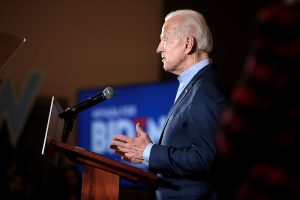The world is now imagining a Joe Biden presidency. While this victory brings optimism to many around the globe, the picture is quite different among Hong Kong’s democracy fighters. Many in the pro-democracy camp put all their hopes on President Donald Trump for his “tough-on-China” branding. For Hong Kongers who feel they are dependent on the United States taking an aggressive stance against Beijing, a Biden victory would be upsetting. While their concern about Biden being weak on China is understandable, there is room for synergy and collaboration.
As Beijing imposed the draconian national security law on Hong Kong, a hardline approach toward China understandably gave faith to many Hong Kongers who struggle to find hope elsewhere. Protesters’ mistrust of a Democratic administration dates back several presidencies. Many fear Biden will follow the same approach set by former Democratic presidents who prioritized dialogue and trade relations with China. Many are still bitter over the silence of the Obama administration on the 2014 Umbrella Movement and skeptical about Biden’s stance on China given his role in inviting China into the world’s institutions such as the World Trade Organization. True, Democrats have pushed for solidarity with Hong Kong’s protesters, with Nancy Pelosi being a primary sponsor of the Hong Kong Human Rights and Democracy Act that paved the way for U.S. sanctions. But their subtle strategy gave many opportunities for Republican politicians to portray themselves as the saviors of Hong Kong.
As a result, public opinion in Hong Kong has been overwhelming in favor of Trump. Scores of American flags accompanied by slogans like “President Trump, please save Hong Kong” made many appearances at pro-democracy rallies. Even on social media, hashtags such as #hkfortrump and memes lionizing Trump as the defender of democracy against China are abundant – despite his many comments flattering China. Meanwhile, the president-elect’s label as “China Joe” alone indicates what many protesters think of him.
Little access to unbiased news reporting and an overreliance on social media influencers in understanding world politics has created a bitter polarization in Hong Kong. In the hypersensitive post-protest media landscape, local political commentators and second-hand news reports and forums have become the main window into international politics, where ultimately outrageous but ill-verified commentaries, memes, and hand-picked news stories prevailed over objective analysis and factual, non-misleading reporting. Right now, many debunked conspiracies have proliferated, and Biden supporters or bipartisans within the protester camps often found themselves labelled as “pro-China” or out-of-touch “libtards” on internet forums.
Changing these perceptions won’t be easy for Biden, and his administration must make clear their stance on China from the very first days of his presidency. Despite his public image as “China Joe,” Biden has previously directly voiced his support for Hong Kong’s democracy movement and even criticized Trump’s stance for being too weak. Also, it is unlikely that Biden will be soft on China, given the general and bipartisan disfavor against China, let alone pressure from Republicans to act tough.
Two factors will dictate the Biden-Hong Kong relationship: the extent of pressure his administration puts on China, and whether Hong Kongers can move beyond their preconceived perception of Democratic leadership. Though Trump’s hands-on confrontations may seem reassuring on the surface, Biden’s emphasis on multilateralism and human rights will surely make life even more challenging in Beijing. Biden’s multilateralism could arguably deliver confidence to its allies in the Asia-Pacific, and rally other great powers to challenge China to a much bigger extent than Trump ever could. If the Biden administration manages this, the result can be greater than what Hong Kong protesters could ever have hoped for. Therefore, the key for Biden’s administration is whether they can rally U.S. allies and keep up the pressure from the incumbent administration on tough issues such as Taiwan, Xinjiang, and Hong Kong. If they can achieve that, they will instill much hope and energy to Hong Kong’s movement. If not, the existing mistrust will only intensify. The democratic movement may radicalize and disintegrate, and the United States would lose its credibility worldwide as a bastion of freedom.
Second, Hong Kong’s democratic camp needs to harness their cause and grievances amid the new geopolitical landscape. The “China Joe” perception may be hard to change in the short term, but getting exposure to international perspectives and seeking bipartisan support is crucial for continued international awareness and cooperation. The next step will depend on whether protesters and online sentiment could move beyond their emotions and toward objective information, and connect with other politicians and activists from both ends of the political spectrum. It’s a choice between gaining access to sustained global solidarity or remaining in an echo chamber. However, Biden’s next moves and commitment to the Asia-Pacific will be a deciding factor.
If there is synergy, the pushback from Beijing will be relentless, and the democratic camp must be ready. The disqualification of legislators that triggered mass resignations in the Legislative Council was Beijing’s first test for Biden. His administration must be able to keep up the pressure in China while offering more than their predecessors – even before his term begins. If trade wars or sanctions have posed little threat, then his administration needs to offer new ways to counter China’s encroachment in the Asia-Pacific and bring confidence to Hong Kongers.
No matter what happens next, it takes two to tango. While it is up to the Hong Kongers to continue their cause in the new landscape, U.S. policymakers must also walk their talk in defending the aspirations of democracy.

































